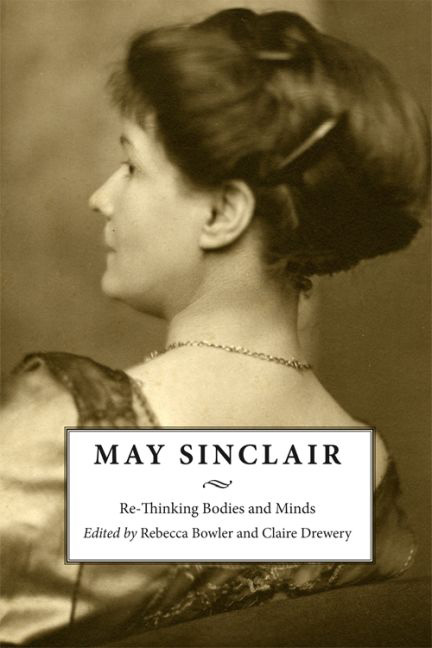Book contents
- Frontmatter
- Contents
- Acknowledgements
- Introduction: May Sinclair's Interdisciplinarity
- Part I The Abstract Intellect
- Part II Abject Bodies
- 6 Disembodying Desire: Ontological Fantasy, Libidinal Anxiety and the Erotics of Renunciation in May Sinclair
- 7 May Sinclair and Physical Culture: Fit Greeks and Flabby Victorians
- 8 Dolls and Dead Babies: Victorian Motherhood in May Sinclair's Life and Death of Harriett Frean
- 9 Why British Society Had to ‘Get a Young Virgin Sacrificed:’ Sacrificial Destiny in The Tree of Heaven
- 10 ‘Odd How the War Changes Us’: May Sinclair and Women's War Work
- 11 Transgressing Boundaries; Transcending Bodies: Sublimation and the Abject Corpus in Uncanny Stories and Tales Told by Simpson
- Notes on Contributors
- Index
10 - ‘Odd How the War Changes Us’: May Sinclair and Women's War Work
from Part II - Abject Bodies
Published online by Cambridge University Press: 26 May 2017
- Frontmatter
- Contents
- Acknowledgements
- Introduction: May Sinclair's Interdisciplinarity
- Part I The Abstract Intellect
- Part II Abject Bodies
- 6 Disembodying Desire: Ontological Fantasy, Libidinal Anxiety and the Erotics of Renunciation in May Sinclair
- 7 May Sinclair and Physical Culture: Fit Greeks and Flabby Victorians
- 8 Dolls and Dead Babies: Victorian Motherhood in May Sinclair's Life and Death of Harriett Frean
- 9 Why British Society Had to ‘Get a Young Virgin Sacrificed:’ Sacrificial Destiny in The Tree of Heaven
- 10 ‘Odd How the War Changes Us’: May Sinclair and Women's War Work
- 11 Transgressing Boundaries; Transcending Bodies: Sublimation and the Abject Corpus in Uncanny Stories and Tales Told by Simpson
- Notes on Contributors
- Index
Summary
On arrival in Belgium in 1914, May Sinclair waited expectantly to hear what kinds of work would be assigned to the five women and nine men of Hector Munro's Ambulance Corps, whether it be managing the wards, stretcher-bearing or other ‘suitable feminine tasks’ (Sinclair 1915a: 23) in the hospital. In her autobiographical account of her war experience, A Journal of Impressions in Belgium (1915), she described herself as ‘utterly submissive’ to the ‘Power’ of the male Commandant, who might well think, ‘what the devil are [five women] doing in a field ambulance?’ (Sinclair 1915a: 23) and send them back to England. This was her chance to take her place alongside brothers, uncles and nephews who had performed military service, an escape from her ‘irrelevant former self’ (Sinclair 1915a: 24) as spinster novelist.
Although middle-class women had been entering the labour force in much larger numbers since the end of the nineteenth century, the opportunities available to them to take on jobs left vacant by men, or to work alongside men on the Front, were unprecedented. Women therefore became increasingly scornful of work seen as suitably feminine: ‘Odd how the War changes us’, concludes Sinclair in her new role as war correspondent (Sinclair 1915a: 23). According to historian Janet S. K. Watson, attitudes to war work between 1914 and 1918 need to be positioned ‘along a spectrum of ideas about work and service’ (Watson 2004: 5), in order to consider the contribution made by women. She argues that ‘women could only be equal-but-different, and their efforts were always perceived as those of women in particular, not just citizens’ (Watson 2004: 7). In ‘Women's Sacrifices for the War’, an article commissioned for the magazine Woman at Home in 1915, Sinclair emphasised the new value of women's work in the context of the suffrage movement, and shifted the emphasis from the notion of sacrifice, ‘what is always expected of women’, to service, aligning ‘woman at her best’ with the British soldier (Sinclair 1915b: 11, 7). In Virginia Woolf's radically pacifist essay Three Guineas (1938), women's participation in the war is denounced as a misguided and dangerous acceptance of militarism, brought about by the British woman's ‘loathing’ for the confinement of the private home: the rush to volunteer for service abroad; ‘that amazing outburst in 1914’, showed that ‘unconsciously [women] desired our splendid war’ (Barrett 1993: 160–1).
- Type
- Chapter
- Information
- May SinclairRe-Thinking Bodies and Minds, pp. 194 - 212Publisher: Edinburgh University PressPrint publication year: 2017



